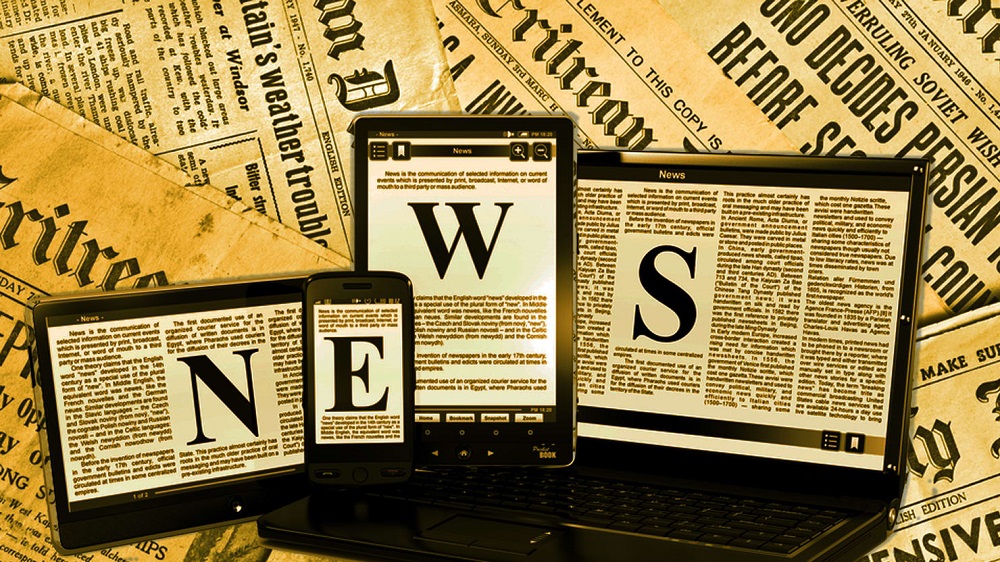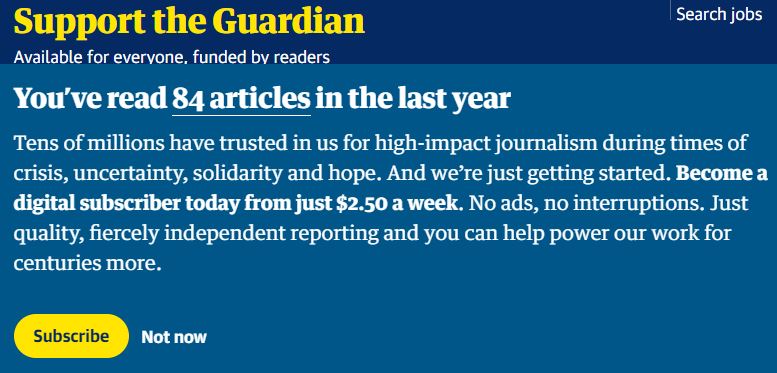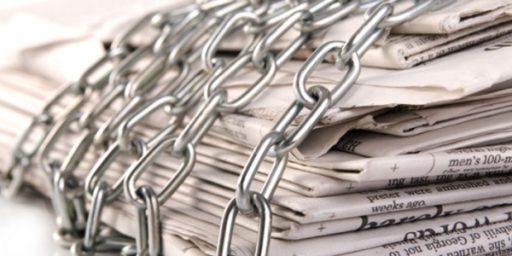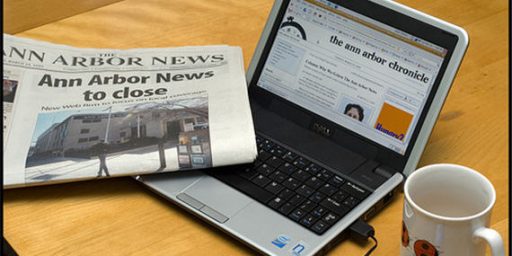The Economics of Long Tail News
There's got to be a better way.

I subscribe to the New York Times, Washington Post, and The Atlantic for news and commentary and a handful of special interest publications for work and recreational interest. But, like most OTB readers, I also read some articles in a ton of other publications, usually following a link from an aggregator like memeorandum or a social media platform.
There are publications—the LA Times and Boston Globe are two examples that spring to mind—where I might read five-ten articles a month but whose paywalls are more trouble to get around than they’re worth. At the other end of the spectrum are sites that are free to access but constantly beg readers to subscribe and support their work. A classic case is The Guardian.
This morning, I was greeted with this:

So, 84 articles a year means that the publication is valuable to me. On the other hand, there are months where I produce more content than that at OTB in my spare time. And, while I can afford $2.50 a week, it’s hard to justify $130 for 84 articles. That’s a buck fifty-five per article, most of which simply duplicate content available elsewhere—including at places I already subscribe.
And that’s just a starter rate. The actual cost of subscribing is much higher:

$20 a month is absurdly expensive—it’s more than I pay for either the NYT or WaPo, both of which I read far, far more often than the Guardian. The $199 annual rate is more reasonable but, still, it comes out to $2.37 an article.
The bottom line is that, unless the Guardian were my primary news source, I wouldn’t subscribe. If they implemented a LAT or BoGlo-style hard paywall, I’d simply stop reading. But, at the same time, I’d prefer to be able to read all three sites whenever I wanted, both for the additional perspectives they would provide and because I think their journalists do good work for which they deserve to make a living.
Apple and others have tried to introduce bundling plans of the type that we all use nowadays for music and video streaming. All have, for whatever reason, failed. But something along those lines is simply inevitable. Otherwise, I just don’t know how anything but the flagship publications and highly-specialized niche outlets will survive.






What they need is some kind of per article pay method. If I trust the person who linked or otherwise know it is substantial, I’d pay a buck to read it but I wouldn’t subscribe.
Is it the price or the principle? Is there are price at which you would subscribe to the Guardian?
One possibility is for the publishers to take advantage of ongoing consolidation. Gannett owns a bunch of papers from which I read an occasional article. Or several articles in a short period when there’s a local story developing. Subscribing to the individual papers on the terms offered is ridiculous. But I would pay a reasonable monthly amount for access to all of Gannett’s papers.
Full disclosure: I do pay for a subscription to my local daily paper, owned by Gannett, in order to help ensure that local news coverage continues.
@David Schuler:
Probably. It’s annoying to have to register with dozens of sites but I’d probably give them a buck a month. That would require them to convince an inordinate number of people to subscribe but it might well be easier to get 14 people to give them a buck a month than to get 1 to give them $165 a year.
Wow. I don’t actually read the Guardian–I only read stuff that others send me or post here, and they’re telling me that I’ve read 115 articles this year.
For reference, $20/month is what a subscription to my community’s local paper costs. 4 sections in a typical issue consisting of 10-14 pages. Each section being one broad leaf and a half leaf usually. It’s still less than the $2/daily copy rack price.
Providing news is expensive. Not that you (or any of the rest of us) don’t realize that. And probably disproportionally valuable relative to what we believe is “fair.”
I don’t subscribe but I do contribute to the guardian at a much lower rate that I can afford.
@James Joyner:
The need for a universal way of making micropayments over the internet has been out their for 20 years now, but no one has figured out a way to make the model work. From what I’ve read, the big stumbling block is the credit card processing cartels.
I like the Guardian for personal reasons – but I also subscribe. When GONE came out it was reviewed in The Guardian by a certain beloved British kid book author. (Currently dead.) It was a bit of a hit job and he was very annoyed at what he thought was an overly-cinematic style. So, naturally, I wrote a response. It was. . . well, it was exactly what people who read me here would expect.
I thought it’d be funny to start a literary feud. Because I’m mature like that. My publisher felt differently.
The Guardian generously agreed to spike my calm, reasoned, in no way objectionable – aside from some possible snark about jealous, washed-up writers using me to rationalize their own failures – and I (my publisher) was grateful.
Also I like David Mitchell’s columns.
In a way, we’re experiencing a regression to the mean.
Think back to before the internet (like 15,000 years go, right?), and consider what news you consumed and how.
People mostly subscribed to one newspaper, if they did at all. You heard of some with multiple subscriptions, but often that was business related. On TV the network news and local news all came in at the same time in different channels, so you watched one (or channel-hopped between them). There were a few cable news channels you had to pay for. There were weekly news magazines you could subscribe to, and monthly magazines of other types. An you paid for all those choices without a second thought (and not thinking of it as a paywall).
Then with the internet growing, there came a long period where a lot of all that content was available free 24/7. That business model did not work out, and now we’re back to paying for subscriptions to papers and magazines, even if we read them online.
@Kathy: Print publications were also subsidized by advertising— to the point where the subscription fees were basically covering the paper. But, it’s really hard to measure the impact of an ad in a newspaper in most cases.
Internet publications and ad networks have shown that ads aren’t worth as much as people thought they were — you can measure conversion, click through, interactions and time on page.
Plus, with all the targeting, having 50,000 readers on a news story isn’t awesome if they are all the wrong readers for your ad inventory — or if they are too interested/disgusted in what they are reading.
You don’t read about a famine in a war-torn country, or the horrors of liberals corrupting and indoctrinating our youth in colleges by banning Dr. Seuss, and think “I need new shoes…”
But, if you want to help your favorite newspaper, browse for cars, go read the news, and open the ads for cars in another window… as of a few years ago at least, that was some money.
I used to buy a hard copy newspaper every day. From memory it cost $1, 20 years or so ago, and a bit extra for the weekend editions. And I read it, not quite from cover to cover, but for at least an hour. Saturdays were special; a relaxed late breakfast with the Sydney Morning Herald with its supplements and magazine could easily last three hours. So call it $40 a month and I regarded it as good value.
I stopped buying newspapers once I could read them online for free, via a broadband connection that meant storis and pictures could load almost instantly. And of course those were the halcyon days when I could browse everything from the SMH to the Washington Post to the Straits Times, all for free.
There’s no way I would revert to a single subscription, or even a handful of them, as long as free sources like the BBC and Australian Broadcasting Corporation continue to provide high quality news services. The interesting question is what will happen to the vast online network of commentary sites like this one, if and when newspapers like the NYT go out of business, or crack down on other sites copying and pasting their material. Countless sites from reasonably worthwhile ventures like The Hill to trash like Gateway Pundit depend on traditional news outlets for most of their material. Their writers would be lost if they didn’t have a daily feed of stories in traditional newspapers to launch their own commentaries. Whatever transpires, I expect only older readers will consider taking out subscriptions to their ‘favorite newspaper’.
Your great compromise is likely this: your public library. There are publications that I subscribe to. But also a great many more I read thanks to my library card. I get the content. The publisher is paid via my library. It’s win win.
(For example – I personally subscribe to my local paper and WaPo. I read the NYT, Business Journal and several magazines via my library. You might be surprised just how many paywalls you can get past that way.)
@Alex Knapp:
You have to go to the library and use their computers? Or just use the library’s login? I’ve got access to all manner of databases through the university but not in a way that makes surfing the web easy.
@Gustopher:
On sites without a paywall, I make sure to click on ads a few times, naively assuming that helps. In paywalled sites that allow you a few free peeks, I don’t click on ads.
@James Joyner:
Bwa ha hahahahahahaha.
Sigh.
It’s really simple, Dr. J. You go into the library. They have books, newspapers, magazines. Printed on paper. New ones come in, old ones go to archives. You take the paper, magazine, or whatever off the shelf or rack, go over to a table and chair, sit down and actually read it. No computer, e-reader, or log-in required.
I mean, I’m a Luddite, and I know that. Or was that a snarky joke that I missed?
@flat earth luddite: I can’t imagine that Alex is suggesting driving to the library and grabbing hard copies of newspapers as a substitute from being able to follow links to articles thst I happen to encounter on various searches, regardless of which device I happen to be on. It’s like saying a public bus is a viable substitute for a convertible sports car.
@David Schuler:
No
@James Joyner: From amy device. In some cases, library login following a link from its website. In others, via an app you use your library credentials to log in to.
@Alex Knapp: Cool. It’s been quite a few years since I availed myself of the county library’s resources, given that I have access to a university library. But I’ll check out the local offerings.